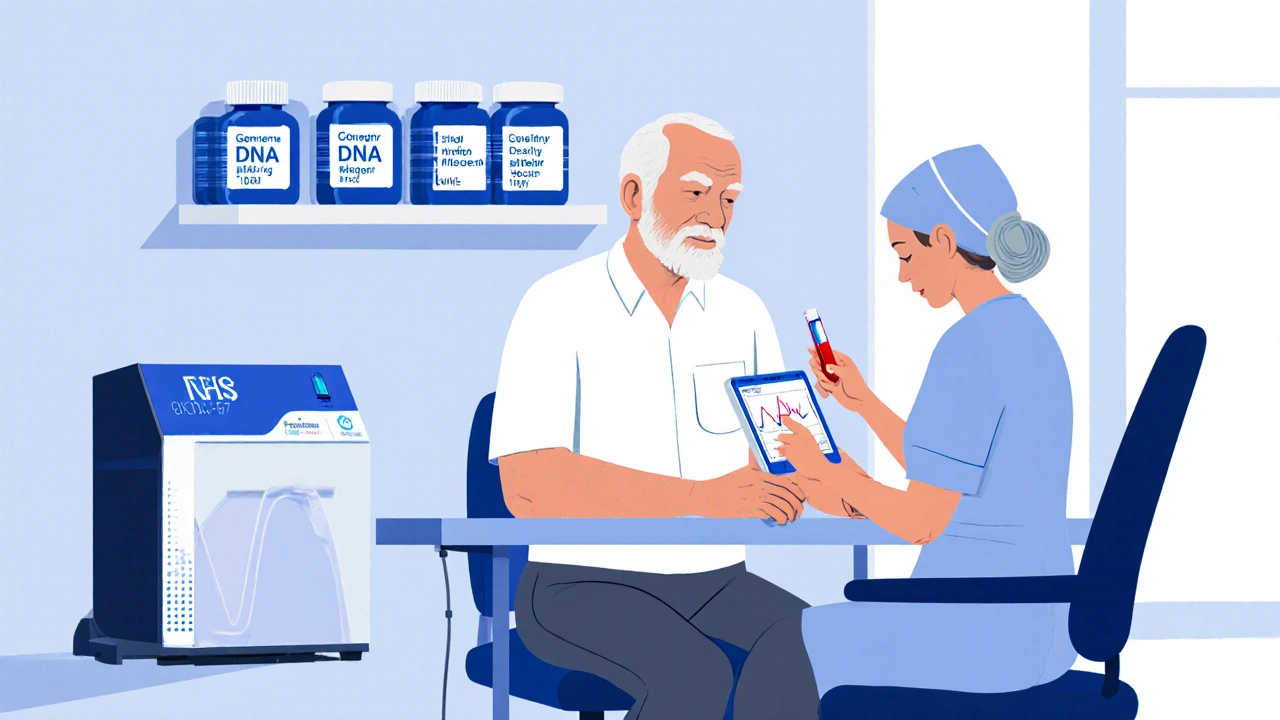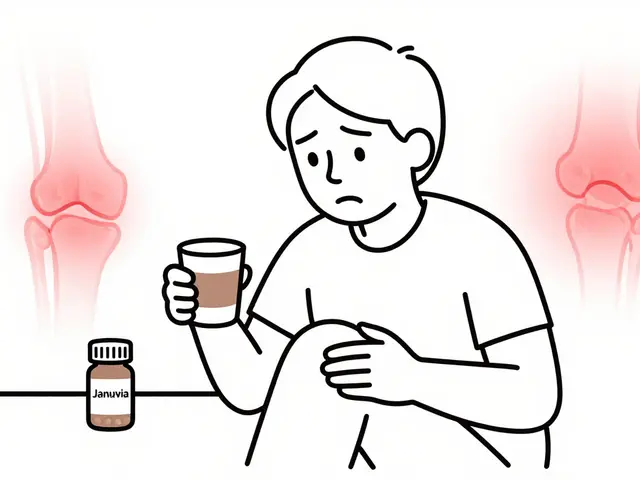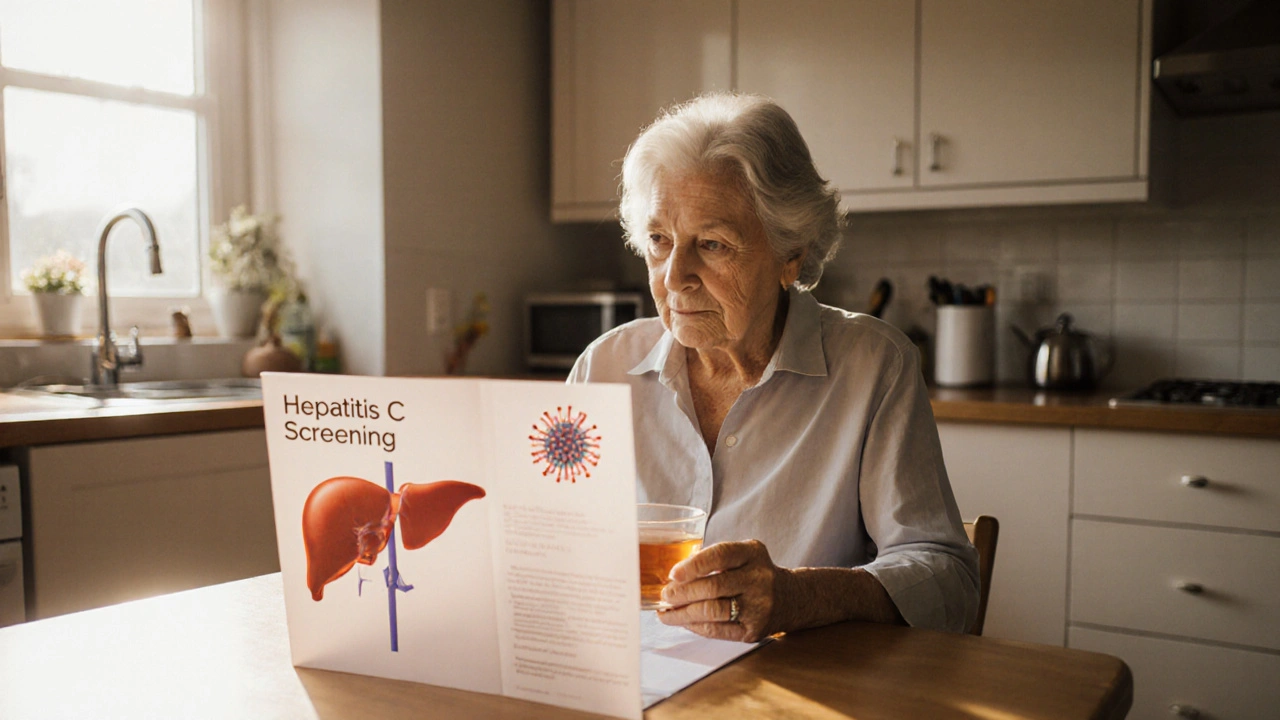Hepatitis C Risk Assessment for Older Adults
Assess Your Risk for Hepatitis C
Answer the following questions to see if you should consider getting tested for hepatitis C. This tool is particularly important for individuals aged 65 and older.
Your risk assessment will appear here after answering the questions and clicking "Check My Risk Level"
Imagine learning you have a silent virus that’s been hiding in your liver for years, and now you’re past 65. That’s the reality for manyhepatitis cpatients who reach older age. The good news? Modern medicine offers cures, but the journey looks different when you’re navigating retirement, multiple prescriptions, and age‑related health changes. This guide walks you through what older adults need to know-from risk factors and screening to treatment choices and daily self‑care.
What Is Hepatitis C?
Hepatitis C is a blood‑borne viral infection that primarily targets the liver. The virus belongs to the Flaviviridae family and spreads through unsafe injections, transfusions before 1992, and occasionally via sexual contact. Over 70million people worldwide live with chronic infection, and many remain undiagnosed until later in life.
Why Aging Changes the Game
As we get older, several physiological shifts affect how hepatitisC behaves:
- Immune system strength declines, a process called immunosenescence, making it harder to clear the virus naturally.
- Long‑standing infection often leads to fibrosis and eventually cirrhosis, especially when combined with alcohol use or metabolic disease.
- Common comorbidities-diabetes, hypertension, kidney disease-can worsen liver outcomes and limit medication options.
- Age‑related changes in drug metabolism mean doses that work for younger adults may need adjusting for seniors.
Understanding these factors helps older adults and their caregivers make smarter decisions about testing and treatment.

Screening and Diagnosis for Older Adults
Because hepatitisC often produces no symptoms for decades, proactive screening is crucial. The UK NHS recommends a one‑time test for anyone born between 1945 and 1965, a group that now includes many retirees.
- Antibody test (anti‑HCV): Detects whether you’ve ever been exposed. A positive result leads to confirmatory testing.
- RNA PCR (polymerase chain reaction): Measures the amount of viral RNA in the blood, confirming active infection and guiding treatment planning.
- Genotype testing: Determines which strain (1‑6) you have, though newer direct‑acting antivirals (DAAs) work across most genotypes.
Older adults should discuss screening with their GP, especially if they have a history of blood transfusions, dialysis, or tattooing before the early 1990s.
Modern Treatment Options
Until the early 2010s, interferon‑based regimens were the only cure, but they came with severe side effects and low success rates in seniors. Today, direct‑acting antivirals (DAAs) dominate the landscape.
| Aspect | Interferon‑Based Regimens | Direct‑Acting Antivirals (DAAs) |
|---|---|---|
| Duration | 24‑48 weeks | 8‑12 weeks |
| SVR (cure) Rate | 45‑60% (lower in older adults) | 95‑99% across ages |
| Side‑effects | Flu‑like symptoms, depression, anemia | Fatigue, mild headache; rare drug‑drug interactions |
| Monitoring | Frequent blood draws, mental health checks | Baseline labs, occasional liver function tests |
| Cost (UK NHS) | Often not funded for older adults | Fully funded for eligible patients |
DAAs such as glecaprevir/pibrentasvir, sofosbuvir/velpatasvir, and elbasvir/grazoprevir are taken orally once daily and have minimal interactions with common geriatric meds. However, seniors on anticoagulants, statins, or antiretrovirals should consult a hepatology pharmacist to fine‑tune dosages.
Maintaining Liver Health Beyond Medication
Even after a cure, protecting liver function remains key, especially for older adults who may already have some scarring.
- Alcohol moderation: Limit intake to ≤1 unit per day for women and ≤2 units for men; excessive drinking accelerates fibrosis.
- Vaccinations: Get immunized against hepatitisA and B to prevent co‑infection. A vaccination plan is often coordinated through the GP.
- Balanced diet: Emphasize leafy greens, lean protein, and omega‑3 fatty acids; avoid high‑sugar, high‑fat processed foods that can worsen fatty liver disease.
- Regular exercise: Even light walking 30 minutes most days improves insulin sensitivity and reduces liver fat.
- Manage comorbidities: Keep blood pressure, blood sugar, and cholesterol in check; uncontrolled diabetes fast‑tracks liver damage.
Routine liver function tests every 6‑12months help catch any re‑emergence of issues early.

Working with the NHS and Specialists
In the United Kingdom, the National Health Service (NHS) provides comprehensive hepatitisC care at specialized liver centres. Here’s how older adults can navigate the system:
- Book an appointment with your GP and request a hepatitisC screening if you’re in the at‑risk age group.
- If positive, the GP will refer you to a hepatology clinic, where a liver‑specialist will order confirmatory RNA PCR and genotype tests.
- The specialist will assess liver fibrosis using non‑invasive tools such as FibroScan, or, if needed, a biopsy.
- Based on the assessment, the clinician will prescribe a suitable DAA regimen and arrange follow‑up appointments.
- For financial concerns, remember that the NHS covers approved DAA courses for eligible patients, eliminating out‑of‑pocket costs.
Don’t hesitate to bring a trusted family member to appointments-they can help track medication schedules and ask clarifying questions.
Quick Checklist for Older Adults
- Know your birth year - if born 1945‑1965, you’re in a high‑risk cohort.
- Ask your GP for a hepatitisC antibody test.
- If positive, complete RNA PCR and genotype testing.
- Discuss liver fibrosis staging - FibroScan is quick and painless.
- Review all current medications with a pharmacist to avoid DAA interactions.
- Follow the prescribed DAA course - usually 8‑12weeks.
- Schedule post‑treatment liver function labs 12weeks after cure.
- Adopt liver‑friendly lifestyle habits (moderate alcohol, balanced diet, regular exercise, vaccinations).
Frequently Asked Questions
Can I be cured of hepatitisC at age 70 or older?
Yes. Modern direct‑acting antivirals achieve cure rates of 95‑99% even in patients over 70, provided they have no severe decompensated cirrhosis. Treatment is oral, short‑term, and usually well‑tolerated.
Will my existing medications interfere with DAA therapy?
Some drugs, especially certain statins, anti‑convulsants, and HIV protease inhibitors, can interact with specific DAAs. A hepatology pharmacist will review your medication list and adjust doses if needed.
Do I need to continue liver monitoring after I’m cured?
Yes. Even after the virus is cleared, any pre‑existing fibrosis or cirrhosis remains. Annual liver function tests and periodic FibroScans are recommended, especially if you have other liver‑risk factors.
Is hepatitisC testing covered by the NHS for seniors?
Yes. The NHS offers free one‑time screening for the at‑risk birth‑cohort and covers DAA treatment for eligible patients, regardless of age.
Can lifestyle changes alone reverse liver damage?
Lifestyle improvements (reducing alcohol, healthy diet, exercising) can halt further fibrosis and, in early stages, may even shrink scar tissue. However, once cirrhosis is established, damage is largely irreversible, underscoring the importance of early detection.
Facing hepatitisC later in life can feel overwhelming, but with routine screening, effective DAAs, and proactive liver care, older adults can achieve a cure and enjoy a healthier retirement. Talk to your GP today-your liver will thank you.






Comments
18 Comments
Dexter Smith
Your article is just a glorified brochure for the NHS.
Cherish Capps
Hey, i get it u’re frustrated but the info actually helps a lot of seniors.
Amy Carpenetti
The piece does a solid job laying out why age matters in Hep C care it’s not just about the virus but the whole body’s response.
Paul Griffin
I appreciate the thoroughness of this guide; it provides a clear roadmap for older adults seeking screening and treatment.
Michael Tekely
Great rundown! The focus on DAAs, drug‑drug interaction checks, and liver‑friendly lifestyle hacks hits the sweet spot for anyone juggling polypharmacy and trying to stay active.
Oscar Taveras
Positive outlook – the cure rates today are truly encouraging for the senior community.
katie clark
While the article is comprehensive, one might argue it glosses over the socioeconomic barriers that many retirees face when accessing specialist care.
Carissa Engle
Let me dissect the content piece by piece. First the introduction claims hepatitis C is a silent virus which is a reasonable summary but it omits the fact that not all carriers are truly asymptomatic; some present with vague fatigue early on. Second the risk factors list is adequate yet it fails to underscore the magnitude of the 1992 blood‑transfusion cutoff beyond a simple checkbox. Third the screening recommendations cite the 1945‑1965 birth‑cohort without mentioning that many countries have broadened criteria in recent years. Fourth the treatment comparison table correctly highlights DAAs’ superiority but it neglects to mention cost‑effectiveness analyses showing long‑term savings. Fifth the lifestyle section advises moderate alcohol consumption but does not address the nuances of alcohol‑induced liver injury in patients with existing fibrosis. Sixth the guidance on comorbidities is sound but it could benefit from a deeper dive into renal dosing adjustments for sofosbuvir‑based regimens. Seventh the checklist is practical although it might overwhelm a patient with too many bullet points. Eighth the FAQ addresses common questions yet it omits discussion of post‑cure surveillance for hepatocellular carcinoma in cirrhotic patients. Ninth the article’s tone is reassuring, which is beneficial for a senior audience, but it occasionally slips into medical jargon that could alienate lay readers. Tenth the overall structure is logical, moving from risk to treatment to aftercare, which aids comprehension. Eleventh the use of HTML formatting is clean, though some tags appear redundant. Twelfth the script snippet contains a syntax error in the birth‑year condition (a single equals sign). Thirteenth the article could improve by linking to reputable sources such as WHO or CDC guidelines. Fourteenth the mention of NHS coverage is UK‑specific; an international audience might need broader context. Fifteenth the piece correctly emphasizes the importance of vaccination against hepatitis A and B. Sixteenth the recommendation for annual liver function tests aligns with best practice. Seventeenth the encouragement to involve a trusted family member in appointments is a compassionate touch. Eighteenth the article succeeds in demystifying a complex disease for older adults. Nineteenth the only critique remains the occasional lack of citation for statistical claims. Twentieth overall, it is a valuable resource that balances medical accuracy with accessibility.
Dervla Rooney
The analysis is thorough; I would just add that the syntax error should be corrected to avoid confusion for developers.
Johnny Ha
All this NHS fluff is just a distraction from the real cure being suppressed by big pharma.
Mary Cautionary
While the narrative is polished, it occasionally borders on pedantry.
Crystal Newgen
Nice overview, easy to skim when you’re on a coffee break.
Hannah Dawson
Honestly, the conspiracy angle about drug pricing is hardly a conspiracy at all – it’s plain economics.
Julie Gray
One must consider that the epidemiological data presented may be selectively reported, thereby shaping public perception in a manner conducive to institutional agendas.
Lisa Emilie Ness
The guide is clear and concise.
Emily Wagner
Think of the liver as a resilient engine; even after a viral overload, proper maintenance-nutrition, modest drinking, and regular check‑ups-keeps it humming without the need for invasive interventions.
Mark French
Your metaphor elegantly captures the essence of post‑cure care; continued vigilance is indeed paramount.
Daylon Knight
Oh great, another checklist-because seniors love ticking boxes.
Write a comment